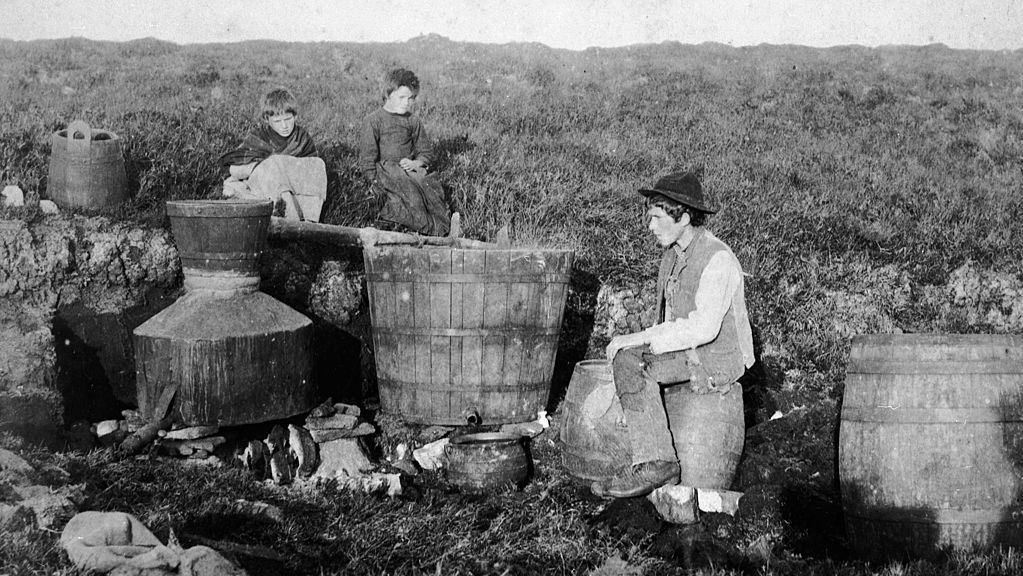Dublin Over With A Good Glass Of Poitin
When I think of the finest drinking experiences in my life, my mind immediately takes me back four years to Limerick, Ireland, and a pub called Nancy Blake's. Just as I was taking the first sip of my drink, the most recognizable drum intro in Irish rock history—Larry Mullen Jr.'s iconic rat-a-tat-tat-tat that opens U2's "Sunday, Bloody Sunday"—started to pound its way out of the bar's speakers. And considering what was in my glass, I thought, "A moment just doesn't get more Irish than this." With the obvious exception of the drinker, who, as the surname in his byline should hint, doesn't have an ounce of Celtic blood in him.
Now, if this moment were a complete cliché, one could assume that I was talking about a pint of Guinness. But, no, my drink of choice when I'm trying to evoke the Emerald Isle is poitin.
Poitin (pronounced PUH-cheen), a clear, unaged, funky spirit that is to Irish whiskey what moonshine is to bourbon and other American grain-based spirits. Its origins actually predate that of whiskey in Ireland; in fact, it's often considered the grandparent of whiskey. It's unclear when distillation arrived in Ireland—somewhere between the 11th and 13th century would be a good guess—but by the 16th and 17th centuries, every other household in the country had its own still.
The name poitin actually derives from pota, or "pot," and poitin means "little pot"—as in "little pot still." The moniker distinguished it from the stuff that was coming out of the large pot stills in the big cities, which the common folk dubbed, in as derogatory a manner as possible, "Parliament whiskey."
In 1661, the English crown decided it needed to start taxing Irish alcohol, mainly to fund its ongoing wars with France. Poitin makers, most of whom operated far from urban areas, continued to distill out of the reach of tax collectors (who lacked the time and resources to be very effective outside the cities). To try to further stifle illicit poitin production, Britain later outlawed small stills under 200 gallons.
"Back in 1661, the whole country loved poitin and continued to for many centuries after," says Dave Mulligan, owner of the Dublin poitin-centric bar 1661 as well as the poitin brand Ban. Mulligan likes to remind those he serves and educates that it was the British, not the Irish, who made the spirit illegal: "It was our national drink, not colonial industrial whiskey from colossal distilleries. We were Irish; it was our culture to distill and drink."
Poitin-making remained illegal until 1997, after most of Ireland came to realize that the ban was unfair and unlawful (not to mention one that wasn't even imposed by the Irish government) and a rising tide of high-profile stakeholders (including some of the world's top spirits conglomerates) lobbied the government to lift the ban. Since then a growing number of distilleries, both established whiskey makers and a new wave of Irish craft producers, have been making legal poitin for the thirsty masses.
The craft cocktail movement has provided a conduit through which modern drinkers can connect with the classic spirit, and it's quite versatile in a variety of drinks whose base spirit is anything from vodka to whiskey (though give it to me neat or on the rocks any day!). It's especially good as a replacement for vodka, especially as drinkers are getting bored with the neutral spirit and are looking for stronger flavors. And poitin's flavors are the furthest thing from neutral. The spirit can be boldly grain-forward—the typical base is barley—and even delightfully vegetal at times. I've tasted a few that I've described as vaguely tomato-ish, though I get a blank stare when I tell people that. Strengths can vary, but the sweet spot's around 50-55% ABV. Some sport ABVs as low as 40%, while others could push upwards of 65%.
Mulligan's bar popularized the Belfast Coffee, a version of the classic Irish coffee that swaps out the whiskey for poitin and uses cold brew instead of regular joe. Add to that some brown sugar syrup and stir it down like a martini. Then pour it into an Irish coffee glass and top it with a finger of par-whipped double cream and some grated nutmeg.
"It drinks more like an espresso martini and would put the humble Irish coffee to shame," Mulligan says. (I can vouch for that. I had a sample at January's San Antonio Cocktail Conference.)
"When not feeling so flashy," Mulligan continues, "I like to drink mine neat with a nice pint of the black stuff in the other hand, boilermaker style."
On the savory side, there's the Bloody Murphy, which, as you can probably guess, is a Bloody Mary with poitin instead of vodka. At 1661, Mulligan serves a mean shrimp cocktail with Bloody Murphy sauce. As for other culinary pairings, "Give me black pudding anything with Belfast Coffee and I'm set up for the day," he says. "Is there a breakfast more Irish than poitin with blood sausage and eggs?"
